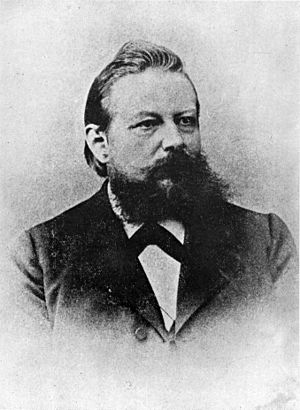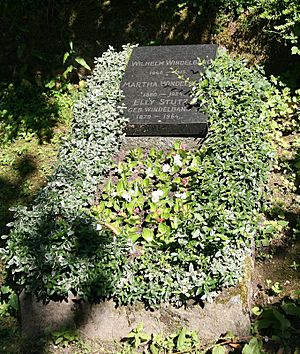Wilhelm Windelband facts for kids
Quick facts for kids
Wilhelm Windelband
|
|
|---|---|

Wilhelm Windelband, prior to 1905
|
|
| Born | 11 May 1848 |
| Died | 22 October 1915 (aged 67) |
| Alma mater | University of Jena University of Berlin University of Göttingen (Dr. phil., 1870) |
| Era | 19th-century philosophy |
| Region | Western philosophy |
| School | Neo-Kantianism (Baden School) Foundationalism |
| Thesis | Die Lehren vom Zufall (The Theories of Chance) (1870) |
| Doctoral advisor | Hermann Lotze |
| Doctoral students | Heinrich Rickert |
|
Main interests
|
Metaphysics, philosophical logic |
|
Notable ideas
|
The nomothetic–idiographic distinction |
|
Influenced
|
|
Wilhelm Windelband (1848–1915) was an important German philosopher. He was part of a group of thinkers known as the Baden School. Windelband is best known for creating two special terms: nomothetic and idiographic. These words help us understand different ways of studying things.
Contents
A Look at His Life
Wilhelm Windelband was born in Potsdam, Germany. His father worked for the government. Wilhelm went to several famous universities. He studied at the University of Jena, the University of Berlin, and the University of Göttingen. He earned his doctorate degree in philosophy in 1870.
Understanding His Ideas
Windelband's most famous contribution was introducing the terms nomothetic and idiographic. These terms are still used today, especially in psychology.
- Nomothetic studies look for general rules. They try to find laws that apply to many cases. Think of science experiments that find rules for how things work.
- Idiographic studies focus on unique things. They look at individual events or people in detail. This helps us understand specific situations.
His View on Philosophy
Windelband was a Neo-Kantian. This means he was inspired by the philosopher Immanuel Kant. However, Windelband believed that to truly understand Kant, one had to go beyond his original ideas. He thought philosophy should talk with natural sciences. He did not think philosophy should just copy science's methods.
Windelband also believed philosophy should focus on human culture. He was against ideas that tried to explain everything with just psychology or history. He wanted a deeper, more critical way of thinking.
Who He Influenced
Windelband's ideas built on the work of other great thinkers. These included Georg Wilhelm Friedrich Hegel and Hermann Lotze. Many important people were his students or were influenced by him. This includes the famous sociologist Max Weber. It also includes theologians like Ernst Troeltsch and Albert Schweitzer.
Learn More
- In Spanish: Wilhelm Windelband para niños
 | Valerie Thomas |
 | Frederick McKinley Jones |
 | George Edward Alcorn Jr. |
 | Thomas Mensah |


